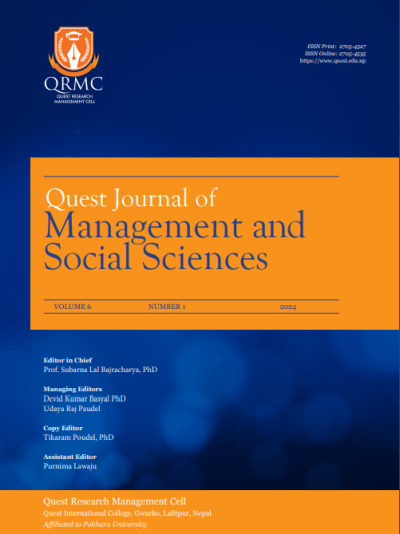Green Marketing and its Impact on Consumer Buying Behavior in Kathmandu Valley
DOI:
https://doi.org/10.3126/qjmss.v6i1.67380Keywords:
Green Marketing, Consumer Buying Behavior, Theory of Planned Behavior, Eco-labeling, Environmental Concerns and Beliefs, Kathmandu ValleyAbstract
Purpose: Promoting goods and services that are socially and environmentally responsible is the primary goal of green marketing. Consumers are increasingly looking for environmentally friendly and sustainable products as they become more conscious of the effects of their shopping decisions on the planet. Hence, utilising a survey in the Kathmandu Valley, this study concentrates on green marketing and its impact on consumer buying behaviour regarding green products.
Method(s): The explanatory research design was adopted as the central research paradigm to discover reality. Non-probability sampling technique to select sample population. It used a convenient sampling technique: 403 respondents were interviewed with a structural questionnaire, where data was collected using the KOBO Toolbox. The data was evaluated by using both descriptive and inferential statistics. Structural Equation Modeling was used to analyse the relationships from 403 responses to see the impact of consumer buying behaviour using SmartPLS software.
Finding(s): The study's findings show that Eco-labeling, Green Packaging and Branding, Green Products, Premium and Pricing and Environmental Concerns and Beliefs have shown a direct positive significant influence on Consumer Beliefs towards the environment. Lack of education and awareness are two critical challenges of green marketing. The managerial challenges and solutions are that promotion and awareness are crucial in advancing green marketing. Companies should successfully promote their eco-friendly products to consumers and educate them on the advantages of green products.
Conclusion: This study shows that the youth of Kathmandu Valley are highly aware of this. Hence, there is a considerable possibility of Green Marketing that is still untapped, according to the research.
Originality: This research is original and is not published in other publications.
JEL Classification: M30, F64, D91, C12, Q50
Downloads
Downloads
Published
How to Cite
Issue
Section
License
Copyright (c) 2024 Quest Journal of Management and Social Sciences

This work is licensed under a Creative Commons Attribution-NonCommercial-NoDerivatives 4.0 International License.
This license enables reusers to copy and distribute the material in any medium or format in unadapted form only, for noncommercial purposes only, and only so long as attribution is given to the creator.




